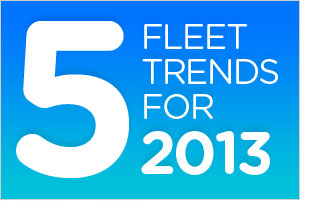S h a r e
Five fleet trends for 2013


Posted by
Martin Brown
January 2013
 Are we all back in our driving seats, so to speak?
Are we all back in our driving seats, so to speak?
The Christmas and new year break is always a good one, but the first week back is always something of a slog.
But with that behind us, and the immediate issues of implementing Q1 strategies immediately before us, what faces us in the future in terms of fleet?
I’ve been consulting my crystal ball for the top fleet trends for 2013. And these are my top five:
- Decreased diesel uptake
Thought I’d start with a bit of a shocker. But I reckon we’ll start to see fewer fleet drivers in diesel cars this year.Why? Partly because the tax efficiency of petrol/electric hybrid cars over the next few years will see many drivers migrate to the alternative fuel company car, but mainly because small capacity turbocharged petrol engines will make a bigger impact as they become increasingly efficient.
We’ve already started to see this trend. It’s been led by Ford and its 1.0-litre turbocharged EcoBoost engine in the Focus; the same engine is also going into the all-new Mondeo to launch at the back end of 2013. But other car makers are following suit with high MPG turbocharged petrol units as the means to significantly reduce diesel emissions further becomes increasingly limited.
Two further crucial factors are the lower price of petrol at the pumps; and the fact that for the time being, diesel company cars still attract a 3% company car tax surcharge.
I reckon we’ll start to see fewer fleet drivers in diesel cars this year. - Average CO2 emissions to fall below 130g/km
At the end of 2012, the average CO2 emissions of all new cars stood at 133.1g/km. By this time next year I believe it will have moved significantly – to sub 130g/km.The Fleet Alliance fleet is already leading the way: in 2012 emissions fell to an all-time low of 125g/km from 130g/km in 2011. I anticipate a similar drop in 2013.
- Fleets to implement 130g/km CO2 ceiling
To a certain extent, you can’t really have point 2 above without fleets changing their policy. But legislation will ensure a new fleet focus on this 130g/km figure.
From April 2013, the 100% leasing disallowance tax break reduces from 160g/km to 130g/km. So sub-130g/km cars will become more tax efficient. At the same time, the main 18% writing down capital allowance tax break moves from 160g/km to 130g/km, too. - Continuing increased volumes for Korean brands
Hyundai and Kia have made enormous steps forward over the last few years in improving the quality of their cars, the design, and CO2 emissions, to the point where they are becoming a real fleet alternative for company car drivers. Especially when P11D prices are so competitive.Last year Hyundai’s market share increased by 18%, Kia’s by an even more impressive 24%. Expect more of the same in 2013.
If you needed any further convincing, it’s little coincidence that, this week, Hyundai announced the appointment of Martin Wilson as fleet director in order to focus more closely on fleet sales.
- Fuel prices
These never go away. Over the last five years fuel prices have risen 50%. There’s no reason to see why this trend should change. So fuel efficiency, and fuel cost reduction strategies, must remain high on every fleet agenda.
So there you go: five fleet trends for 2013. Will I be right? Let’s see this time in 2014!
You also might like…
If you liked this article then check out our posts about similar topics
First Drive: Jaecoo 7 – Range-Rover Looks on a £30k Budget
Why this newcomer matters China’s Chery Group is taking the UK by storm with a two-brand strategy: Omoda targets mains...
Good-enough lease rates aren’t good enough anymore: Introducing Multi-Bid Tendering
In a climate of persistent inflation, unpredictable tariffs and relentless cost pressure, “we’ve always done it this...
Become a Fleet Alliance business partner
I am writing to you about the opportunity to become a business partner of Fleet Alliance The commercial arrangement a...
Charting a Greener Course: Chris Rowthorn signs the Business Wales Green Growth Pledge
When seasoned automotive finance professional Chris Rowthorn left MotoNovo after more than two decades to become a Flee...
Outsourcing Your Fleet: 10 Reasons Fleet Alliance Makes Perfect Sense for Busy Fleet Managers
Running a large corporate fleet means you’re under constant pressure to hit cost, compliance, and sustainability targe...
What makes Fleet Alliance a winner in the SME fleet sector?
We all like an award, an additional trophy for the cabinet - the recognition is important and it’s always good to rece...
10 great cars to have on salary sacrifice 2025
Employers and employees are really catching on to salary sacrifice because you can drive a brand new electric car (EV) a...
How changes to the ZEV mandate can help on the decarbonisation journey
With media headlines stuffed full of tariffs and their impacts on the UK and the world economy, it is perhaps little won...
Ready to make the management of your fleet more efficient?
Request a call back
